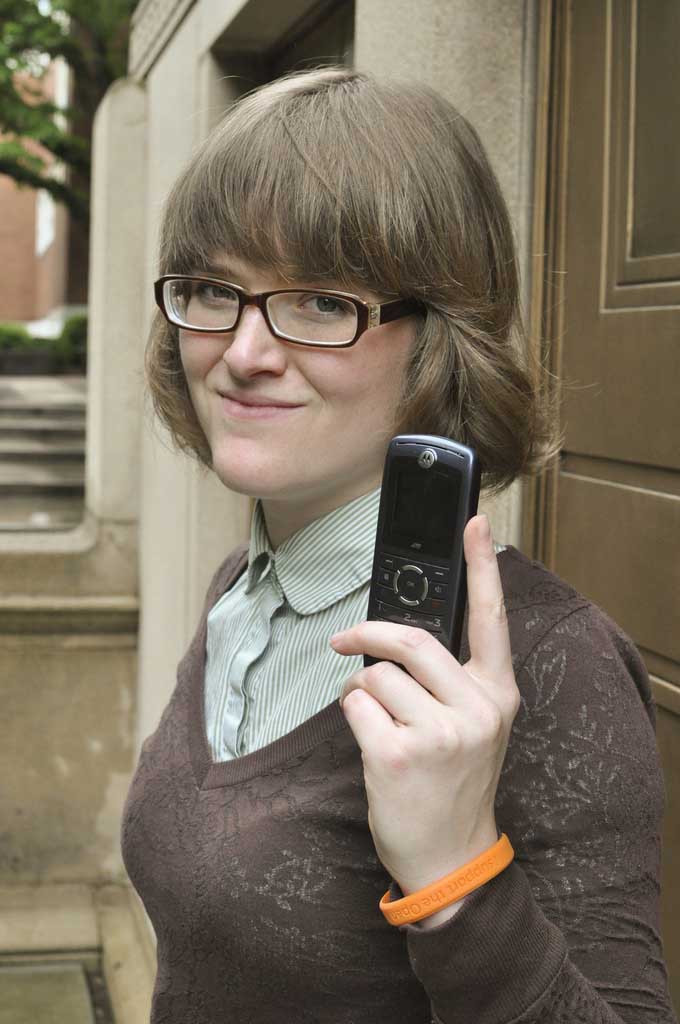 Amber Case and Aaron Parecki are from the future—or, at the very least, they are a bit ahead of their time. They are creating a new software product that will track users’ locations and give them updates, send SMS messages to their friends and colleagues, and do more things that we might not understand. Case and Parecki presented their project, “Geoloqi,” this week at Open Source Bridge.
Amber Case and Aaron Parecki are from the future—or, at the very least, they are a bit ahead of their time. They are creating a new software product that will track users’ locations and give them updates, send SMS messages to their friends and colleagues, and do more things that we might not understand. Case and Parecki presented their project, “Geoloqi,” this week at Open Source Bridge.
BY ANGELA WEBBER
Nerds have taken over the Portland Art Museum, and turned the main ballroom into a “hacking lounge.” Do not be alarmed. This is Open Source Bridge, a four-day conference of local and national software geeks.
Open Source Bridge is a completely volunteer-run conference dedicated to the concept of “open source citizenship:” in which developers learn from one another and connect across projects.
 |
Shoephone: Amber Case carries this phone in her boot to track her location by GPS.photo by Aaron Parecki |
Cyborg anthropologist Amber Case and PHP developer Aaron Parecki presented one such project of their devising, a yet-to-be-released program called “Geoloqi.”
Geoloqi will track a user’s location at all times, and use this data to provide various services. A user can leave himself a note to receive when he gets to a certain location, for example, a reminder to pick up batteries when he’s in the store. The user can send a real-time map to a friend or client, to take the mystery out of when he or she will arrive. People meeting will know exactly what time to expect you if they know exactly where you are—you can even set up an automatic message to send to your boss if the software can tell you’re going to be late for work.
One of the goals of Geoloqi is to automate a certain amount of existence. Case and Parecki seek to make the interface “ambient,” that is, require very little actual interaction with the software in order for it to work. For example, if you set up Geoloqi to turn your lights on at your house when you arrive, you won’t need to interface with the light switch. If you have an automatic alert that will give you the next bus departure time when you arrive at an airport, you won’t need to seek that information out on your phone.
This may seem a bit creepy to you, but Parecki and Case are obsessed with this project. Parecki has been tracking his location using his Android phone for nearly two years. He has maps of his locations, color-coded by speed traveled. Using only data collected from his GPS locations, he has created maps of Portland and Eugene.
Case also carries a phone with her wherever she goes, to track her location. She actually has a phone expressly for this purpose—she is carrying it in her boot at Open Source Bridge.
With questions of security and privacy surrounding open source giant Google and closed-source giant Facebook, Geoloqi may seem like a scary and dangerous thing. But some may not mind so much, according to Don Park, another Portland software developer working on GPS projects.
“For a generation that has grown up posting to Facebook and Flickr, this isn’t such a big deal.” Park said that this generation even reaps the benefits of self-promotion through these digital means.
Case and Parecki, and the Open Source movement, are going mainstream sooner than you might think. Geoloqi will be beta testing this month, and Mayor Sam Adams gave the Open Source Bridge keynote this morning. The future, for better or worse, is now.
Angela Webber is web editor for Oregon Business.


